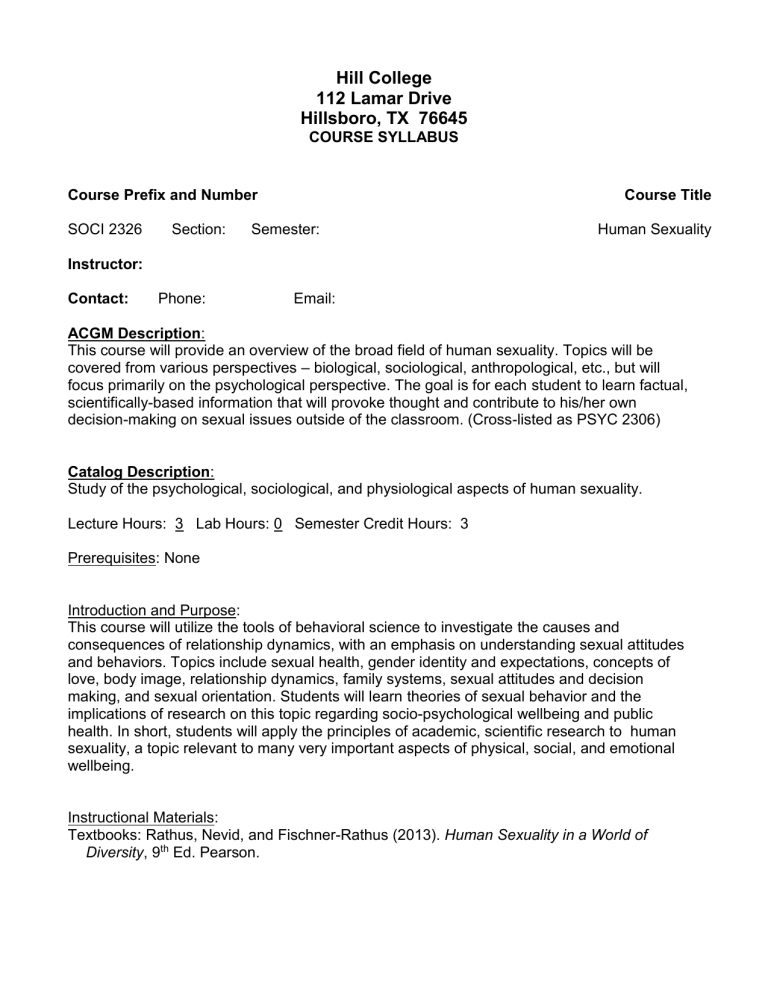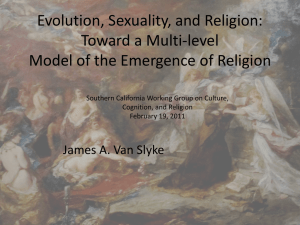SOCI 2306 - Hill College

Hill College
112 Lamar Drive
Hillsboro, TX 76645
COURSE SYLLABUS
Course Prefix and Number
SOCI 2326 Section: Semester:
Instructor:
Course Title
Human Sexuality
Contact: Phone: Email:
ACGM Description :
This course will provide an overview of the broad field of human sexuality. Topics will be covered from various perspectives – biological, sociological, anthropological, etc., but will focus primarily on the psychological perspective. The goal is for each student to learn factual, scientifically-based information that will provoke thought and contribute to his/her own decision-making on sexual issues outside of the classroom. (Cross-listed as PSYC 2306)
Catalog Description :
Study of the psychological, sociological, and physiological aspects of human sexuality.
Lecture Hours: 3 Lab Hours: 0 Semester Credit Hours: 3
Prerequisites: None
Introduction and Purpose:
This course will utilize the tools of behavioral science to investigate the causes and consequences of relationship dynamics, with an emphasis on understanding sexual attitudes and behaviors. Topics include sexual health, gender identity and expectations, concepts of love, body image, relationship dynamics, family systems, sexual attitudes and decision making, and sexual orientation. Students will learn theories of sexual behavior and the implications of research on this topic regarding socio-psychological wellbeing and public health. In short, students will apply the principles of academic, scientific research to human sexuality, a topic relevant to many very important aspects of physical, social, and emotional wellbeing.
Instructional Materials:
Textbooks: Rathus, Nevid, and Fischner-Rathus (2013). Human Sexuality in a World of
Diversity , 9 th Ed. Pearson.
SOCI 2306 Human Sexuality 2
Supplies:
Student may be required to have access to computing technology, basic writing supplies,
Scantrons, or other materials as per instructor. MyLab, if needed, will also be specified by the instructor.
Objectives/Student Learning Outcomes:
“Upon successful completion of this course, students will:
1. Identify common myths of human sexual functioning.
2. Identify human sexual behaviors and sexual responses.
3. Explain the relationship between sexuality and developmental changes throughout the lifespan.
4. Describe the causes, symptoms, and treatments for sexually transmitted infections and the behaviors that increase and decrease the risk of contracting an STI.
5. Describe the principles of effective communication and the specific barriers to effective communication about sex and sexuality.
6. Use an academic sexual vocabulary.
7. Discuss cultural differences in sexual attitudes and behaviors.
8. Identify the occurrence and causes of sexual variations.
9. Identify contraceptive methods and how th ese methods prevent conception.”
Source: Texas Higher Education Coordinating Board, Lower Division Academic Course
Guide Manual, Spring 2013
The students' success in completing these objectives will be measured using a set of examinations and assignments described, in detail under the section of this syllabus headed
“Methods of Evaluation.”
An Annual Assessment Plan will be implemented each year to review course.
Methods of Instruction:
This course will be taught face-to-face and/or by various distance learning delivery methods.
Audio-visual materials and computer-based technology will be used when appropriate.
Students will be shown how to use a calculator where appropriate.
Methods of Evaluation:
Grades in this course will be based on the following evaluative criteria:
Exams will be given during the semester. The average of these exams will make up approximately 50% of the student’s grade. Other required course items compose the remaining 50% of the student ’s course grade. Individual instructor syllabi will specify these items.
SOCI 2306 Human Sexuality 3
Letter grades for the course will be based on the following percentages:
90-100% A
80-89% B
70-79% C
60-69% D
Below 60% F
Course Outline:
Class policies:
Regular attendance at all class meetings (in-person or online) is expected. Disruptions in class will not be tolerated.
Topic Outline:
Topics under study may include any or all of the following:
I. What Is Human Sexuality
II. Research Methods in Human Sexuality
III. Female Sexual Anatomy and Physiology
IV. Male Sexual Anatomy and Physiology
V. Sexual Arousal and Response
VI. Gender Identity, Gender Roles, and Gender Differences
VII. Attraction and Love —Binding Forces
VIII. Relationships and Communication
IX. Sexual Behaviors and Fantasies
X. Sexual Orientation
XI. Conception, Pregnancy, and Childbirth
XII. Contraception and Abortion
XIII. Sexuality in Childhood and Adolescence
XIV. Sexuality in Adulthood
XV. Sexual Dysfunctions
XVI. Sexually Transmitted Infections
XVII. Atypical Sexual Variations
XVIII. Sexual Coercion
XIX. Commercial Sex
SOCI 2306 Human Sexuality 4
Disabilities/ADA
Reports of discrimination based on disability may be directed to the ADA/Section 504 coordinator. The College District designates the following person to coordinate its efforts to comply with Title II of the Americans with Disabilities Act of 1990, as amended, which incorporates and expands the requirements of Section 504 of the Rehabilitation Act of 1973, as amended:
Name: Dr. Heather Kissack
Position: Executive Director of Human Resources
Address: 112 Lamar Drive, Hillsboro, TX 76645
Telephone: (254) 659-7731
Students with qualified and documented disabilities may request accommodations which will enable them to participate in and benefit from educational programs and activities. Students should contact the Academic Advising and Student Success Center for more details at:
254 659 7650 for Hillsboro, 817 760 5650 for Cleburne, or 817 295-7392 for Burleson.
EEO Statement
Hill College is committed to the principle of equal opportunity in education and employment.
The college does not discriminate against individuals on the basis of age, race, color, religion, sex, national origin, disability, genetic information, or veteran status in the administration of its educational programs, activities, or employment policies.
Instructor’s Class Content:
See th e following pages for your specific instructor’s course information.






